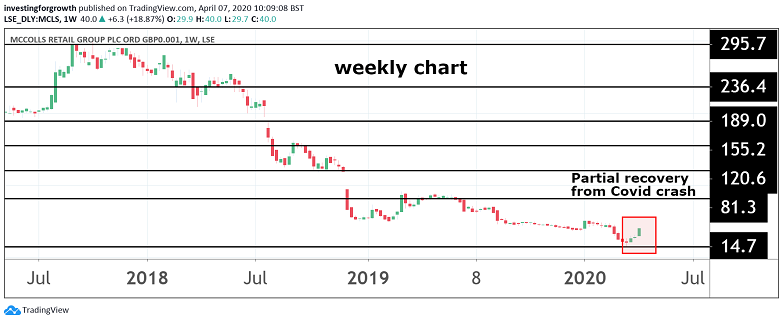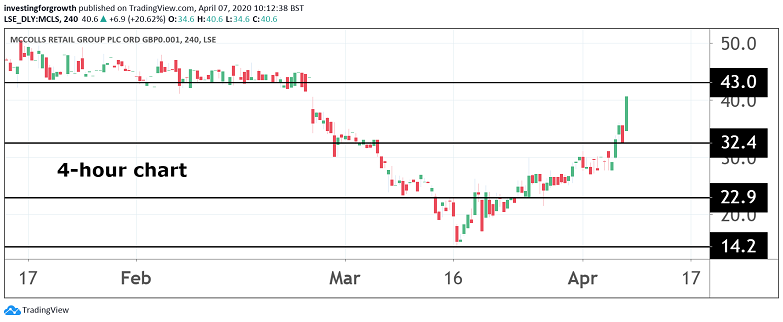Stockwatch: a bet on recovery as crisis could transform sales
Should you follow the chairman and buy this increasingly popular retailer as a hedge for troubled times?
7th April 2020 10:33
by Edmond Jackson from interactive investor
Share on
Should you follow the chairman and buy this increasingly popular retailer as a hedge for troubled times?

Should you follow the chairman and buy this increasingly popular retailer as a hedge for troubled times?
A vigorous stock market rebound affirmed my 24 March comment about how a slowing in the rate of new infections of Covid-19 would be the crux for sentiment, rather than fatalities.
The story driving expectations is moving toward how lockdowns can be lifted. Desperate for good news, markets have latched onto Italy and Spain consistently improving, and also New York showing a sharp fall in those “newly hospitalised” (versus apocalyptic fears barely a week ago) despite Singapore and South Korea experiencing new cases as they test ways out of lockdown.
Bulls versus bears among investment bank strategists
Big beasts are divided. Yesterday, Morgan Stanley, a staunch bear for the last couple years, turned bullish on a 6-12 month view, arguing “Bear markets end with recessions” and trawling up the adage: “Never let a good crisis go to waste”.
Its key strategist pushes an inflationary case for risk assets (as have I) and the time to buy is already here after a forced liquidation in the past month. Technically, within only a few weeks, a 20% fall - defining a bear market - has led to a 20% rise, heralding a return of the bull.
Yet JP Morgan counsels against buying all but defensive stocks, on the basis that past recessions show it takes stocks at least 18 months on average to reach a final low.
“Trying to buy simply based on technically oversold levels and admittedly larger by the day policy support might be missing the elephant in the room – the first consumer and labour market down-cycle in 11 years.”
- Sainsbury’s ex-boss Justin King on Covid-19, shares and shoppers
- Coronavirus crisis: An essential guide for all investors
- Take control of your retirement planning with our award-winning, low-cost Self-Invested Personal Pension (SIPP)
A recessionary feedback loop is likely also the risk that renewed economic activity sparks fresh Covid-19 infections. JPM’s kudos is based on having been bullish on equities for the last decade, turning firmly bearish last month.
A compromise would be drip-feeding cash into stocks while ensuring reserves also defensive plays. I’ve argued that the case for food retailers rests on the duration of “lockdown”, and the last few days have signalled a revelation for those smaller/local operators.
Smaller local grocers enjoy revolutionary footfall
Most people are experiencing lengthy queues outside supermarkets, for half an hour or more, now that numbers inside are limited. Research has emerged showing smaller grocery shops such as Co-op and McColl’s (LSE:MCLS) enjoying a surge in revenues – partly for topping up on essentials, and as some people leave supermarkets alone.
Supermarket panic-buying peaked three weeks ago, with transactions up 15%, then returned to normal around 21 March. I’m surprised at that given the extent of meals now requiring substitution at home, though if borne out it does undermine big food retailing stocks as defensive.
The choice of smaller listed equities like these is scant however, it essentially boiling down to McColl’s Retail, a low-margin and highly leveraged turnaround play, off-limit to disciplined investors but which now offers speculative intrigue should the Covid-19 episode sustainably help transform its revenues.
This could tilt the risk/reward profile on its shares positively after becoming seen as mere option money: down below 15p on 16 March versus 295p just over a couple of years ago.

Source: TradingView Past performance is not a guide to future performance
Despite risks, the chairman buys £18,750 of equity
At 36p currently, the market cap is around £40 million versus annual revenue of over £1.2 billion, but there’s also net debt of £94 million. Yet the chairman buying 75,000 shares at 25p on 25 March exemplifies a case for upside. Market cap is only just above £37 million of balance sheet cash, outweighed by debt, albeit which provides some margin of safety and should help McColl’s improve its estate.
A key question is, can the Covid-19 crisis help transform McColl’s trading fundamentally better versus the bigger supermarkets? The group owns over 1,400 McColl’s convenience stores and Martin’s newsagents, and is also the largest operator of Post Offices in the UK.
Troubles accumulated however after acquiring 298 shops in 2016, integrating them in 2017, then to experience supply chain disruption in 2018 – hence a whopping £98.6 million goodwill impairment charge that smashed “headline” figures.
It looked somewhat like a “kitchen sinking” exercise as various projections were de-based and which linked to the cost base, including a rise in the National Living Wage.
Yet the chairman proclaimed last 26 February with the 2019 results, “a strong platform for future growth.”

Source: TradingView Past performance is not a guide to future performance
Partnership with Morrisons is a second catalyst
Speculative interest in McColl’s had previously related to a trial arrangement with Morrison (LSE:MRW), effectively towards a rival chain of decently-stocked smaller grocers, as an alternative to Sainsbury's (LSE:SBRY) Local or Tesco (LSE:TSCO) Express. This is small beginnings, however: Morrison said in January that the first 10 Morrisons Daily stores had shown ambivalently “strong” sales with the trial being extended to another 20 or so imminently. But the timing is fortuitous, and also bridges the marketing gap where small grocers can be seen as offering a much narrower range with fewer fresh items, all at higher prices.
McColl’s medium-term aim is an estate of some 1,100 stores, larger than they have been in recent years, hence better choice. In the last financial year to 24 November, 23 stores underwent “refreshes”, only 10 new related to Morrisons, and 120 were closed or sold.
Between 400 and 500 still require updating, meaning costs as well as benefits.
The last two years’ cashflow statements show acquisitions of property, plant, equipment etc in the high-teen millions of pounds, albeit more than offset in 2018 by business sales proceeds. So, an estate currently of over 1,400 outlets implies investment needs should at least be mitigated by continued disposals.
Adjusting for non-cash items impacting profit, 2019 gross cashflow from operations rose 23% to £26 million, although after working capital movements it fell from £66.7 million to £21.2 million. Strong “cash generation” in 2018 was, however, boosted by a £48 million rise in trade payables.
| McColl's Retail - financial summary | ||||||
|---|---|---|---|---|---|---|
| year end 24 Nov | 2014 | 2015 | 2016 | 2017 | 2018 | 2019 |
| Turnover (£ million) | 922 | 932 | 950 | 1,149 | 1,242 | 1,219 |
| Operating margin (%) | 2.0 | 2.5 | 2.1 | 2.0 | 1.3 | -7.4 |
| Operating profit (£m) | 18.9 | 23.6 | 20.4 | 23.5 | 15.9 | -90.4 |
| Net profit (£m) | 9.9 | 16.1 | 13.9 | 14.2 | 6.9 | -95.9 |
| EPS - reported (p) | 10.1 | 15.4 | 12.8 | 12.3 | 5.9 | -83.3 |
| EPS - normalised (p) | 21.3 | 15.4 | 14.7 | 17.9 | 9.2 | 11.6 |
| Price/earnings ratio (x) | 3.1 | |||||
| Operating cashflow/share (p) | 35.4 | 41.6 | 20.0 | 46.9 | 53.6 | 17.4 |
| Capital expenditure/share (p) | 15.5 | 16.8 | 14.7 | 22.2 | 17.1 | 12.5 |
| Free cashflow/share (p) | 19.9 | 24.8 | 5.3 | 24.7 | 36.6 | 4.8 |
| Dividends per share (p) | 8.5 | 10.2 | 10.2 | 10.3 | 4.0 | 1.3 |
| Covered by earnings (x) | 1.2 | 1.5 | 1.3 | 1.2 | 1.5 | -64.1 |
| Cash (£m) | 11.4 | 14.5 | 3.8 | 14.3 | 28.5 | 37.0 |
| Net debt (£m) | 37.4 | 31.6 | 37.0 | 142 | 98.6 | 94.1 |
| Net assets (£m) | 117 | 126 | 141 | 146 | 142 | 38.7 |
| Net assets per share (p) | 112 | 120 | 122 | 127 | 123 | 33.6 |
| Source: historic Company REFS and company accounts |
Marketing opportunities may (more than) offset financial risks
McColl’s reckons over half its customers live within just 400 metres of its stores – a big plus for people to buy what they need, especially elderly and vulnerable customers.
So, continued revamping plus expansion of the Morrisons offering could work well. It seems likely that many shoppers will adhere to changed habits for a year, maybe two, partly for fear of big supermarkets while Covid-19 remains at large.
Otherwise, 2019 revenues were pretty flat despite recognising store closures. Working with Morrisons was said to help a gross margin improvement in the second half year, although, fundamentally, the business remains low-margin – the table showing past years stuck around 2% at the operating level.
- Where to find dividend income from UK shares
- 11 UK stocks where experts think the dividend is safe
- A checklist for finding dividend shares in a crisis
2019 administrative expenses, as a percentage of revenue, were steady at around 25% amid living wage inflation of 5% and £3 million additional rent from sale-and-lease-back programmes. More positively, there’s a new chief financial officer and chief commercial officer.
Some investors will be deterred by two glaring issues
Finance costs of £8 million swallowed just over half of 2019’s operating profit in a context where net debt only edged down 4.6% to £94.1 million.
The interest cost seems excessive considering 85% of debt is structured long-term, which demands explanation in the financial review, having been the same as 2018. Otherwise, and considering huge monetary stimulus underway, indebted companies are being offered a reprieve.
The other oddity is an eye-popping £215.5 million trade payables versus £39 million trade receivables, an imbalance that very slightly worsened over the year and queries what to extent McColl’s has accumulated delayed payments to suppliers which also should have been explained in the financial review.
The firm’s true level of gearing can therefore be regarded as significantly higher than around 240% on a net basis, and where £38.7 million net assets are swollen by £156.9 million intangibles. More positively, on 28 February, bank facilities amended and extended to May 2022.
A call option on shopping restrictions persisting
Despite inherent risks, McColl’s has a big opportunity to capitalise on potential reward and to re-rate its longer-term marketing. Continued recovery in its share price – the rating around 3x 2019 normalised earnings – could enable an equity capital-raising (that would not be so dilutive) to cut what seems to be expensive debt.
A 24 March Covid-19 update cited all stores currently open, and a pro-active response with wholesale partners while investigating complementary channels to supply essential products.
As a small recovery punt and portfolio hedge lest hard times persist: Buy.
Edmond Jackson is a freelance contributor and not a direct employee of interactive investor.
These articles are provided for information purposes only. Occasionally, an opinion about whether to buy or sell a specific investment may be provided by third parties. The content is not intended to be a personal recommendation to buy or sell any financial instrument or product, or to adopt any investment strategy as it is not provided based on an assessment of your investing knowledge and experience, your financial situation or your investment objectives. The value of your investments, and the income derived from them, may go down as well as up. You may not get back all the money that you invest. The investments referred to in this article may not be suitable for all investors, and if in doubt, an investor should seek advice from a qualified investment adviser.
Full performance can be found on the company or index summary page on the interactive investor website. Simply click on the company's or index name highlighted in the article.
Disclosure
We use a combination of fundamental and technical analysis in forming our view as to the valuation and prospects of an investment. Where relevant we have set out those particular matters we think are important in the above article, but further detail can be found here.
Please note that our article on this investment should not be considered to be a regular publication.
Details of all recommendations issued by ii during the previous 12-month period can be found here.
ii adheres to a strict code of conduct. Contributors may hold shares or have other interests in companies included in these portfolios, which could create a conflict of interests. Contributors intending to write about any financial instruments in which they have an interest are required to disclose such interest to ii and in the article itself. ii will at all times consider whether such interest impairs the objectivity of the recommendation.
In addition, individuals involved in the production of investment articles are subject to a personal account dealing restriction, which prevents them from placing a transaction in the specified instrument(s) for a period before and for five working days after such publication. This is to avoid personal interests conflicting with the interests of the recipients of those investment articles.